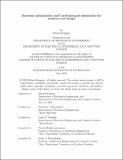Bayesian optimization and Cartesian-grid simulations for artificial reef design
Author(s)
Ronglan, Edvard
DownloadThesis PDF (40.99Mb)
Advisor
Triantafyllou, Michael S.
Terms of use
Metadata
Show full item recordAbstract
Coastal erosion threatens communities close to the shore worldwide, and it has become
a significant concern in recent years due to increased sea levels and storm frequency
driven by global warming. In the search for effective methods to prevent these effects,
natural coral reefs have demonstrated comparable wave energy dissipation to artificial
defenses while also providing a positive influence on the ocean ecosystem. Therefore,
this thesis presents an artificial reef structure with a drag coefficient that is an order of magnitude higher than that of single structures, which positively impacts the
ocean ecosystem by providing shelter for marine species. Energy dissipation was maximized using Bayesian optimization in combination with Cartesian-grid simulations
and towing tank experiments. To ensure the structure’s strength, ease of implementation, and biocompatibility, the reef structures were designed to be porous. Finally,
the complete artificial reef was constructed and tested in a towing tank with waves
to assess its energy dissipation capabilities.
Date issued
2023-06Department
Massachusetts Institute of Technology. Department of Electrical Engineering and Computer Science; Massachusetts Institute of Technology. Department of Mechanical EngineeringPublisher
Massachusetts Institute of Technology